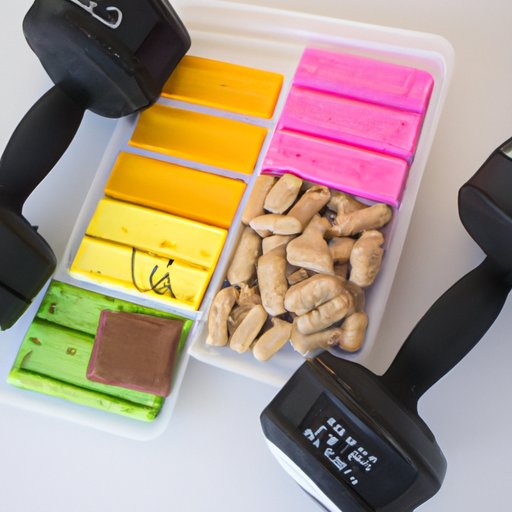
Introduction
Weightlifting is an excellent way to get in shape, as it helps strengthen and tone your muscles, increase your metabolic rate, and improve your overall health. However, it’s not just lifting weights that’s important – what you eat can make all the difference. What you eat before weightlifting is crucial to ensuring your body has the energy and nutrients necessary to power through your workout. In this article, we’ll explore the best foods to eat before a weightlifting session, the optimal timing of your pre-workout meal, macronutrient ratios, supplement alternatives, and the importance of proper hydration.
List of Pre-Workout Foods
Not all foods are created equal, particularly when it comes to pre-workout nutrition. Here are some suggestions for foods to eat before weightlifting:
- Whole-grain toast or bagel with peanut butter
- Banana and almond butter
- Oatmeal with nuts and berries
- Low-fat Greek yogurt and fruit
These foods contain various macronutrients that your body can use for energy. Whole grains and fruits provide complex carbohydrates, nut butter and nuts are high in healthy fats, and yogurt has protein. Protein is particularly important when it comes to building and repairing muscles. Ideally, pre-workout nutrition should consist of a mix of carbs, protein, and fats. A general rule of thumb is to eat around 200–400 calories, around 30 minutes to an hour before you begin to lift.
Timing Considerations
Timing is important when it comes to pre-workout nutrition. To avoid getting an upset stomach during a workout, it’s best to eat a light meal or snack at least 30 minutes before you lift. If you have a big meal, wait at least 2–3 hours to allow for proper digestion before heading into the gym. Keep in mind that everyone’s body is different, so it may take some trial and error to find the perfect timing for your pre-workout meal.
Meal Planning
To make things easier, meal planning is a great way to ensure you’re getting optimal pre-workout nutrition. Good meal planning involves preparing meals and snacks ahead of time, so you always have something good to eat before heading to the gym. Here are some meal planning tips:
- Prep meals and snacks for the week on Sunday
- Cooking food in bulk and freeze it so that you can have it as convenient as possible
- Keep snacks on hand, such as pre-packaged almonds and apples, that can be eaten quickly before a workout
Good meals to cook ahead of time might include boiled eggs, whole-grain pasta salad, and even smoothies that can be prepped and frozen for quick consumption and a great way to kickstart your day.
Macronutrient Ratios
Another important aspect of pre-workout nutrition is the macronutrient ratios in your food. Depending on your exercise goals, you might need more of one macronutrient over the others. Here’s an overview of the optimal ratios for pre-workout meals:
- For those focused on endurance exercises: 70% carbs, 20% fats, and 10% protein
- For those focused on strength, such as weightlifting: 60% carbs, 25% protein, and 15% fats
- For those focused on building muscle: 40–50% carbs, 30% protein, and 20–30% fats
It’s also essential to keep in mind that different people have different dietary needs based on calorie requirements, body types, and goals. Therefore, consulting a certified nutritionist to create the best meal plan would be the best case scenario for your pre-workout nutrition program.
Supplement Alternatives
If you’re not in the mood to eat before your workout, supplements can be an alternative option. One of the most popular supplement options is protein powder. Protein powder can be mixed with water or various other liquids to create a shake that is easy to consume and contains high amounts of protein. Additionally, energy bars are another option that can help fuel your workout. Energy bars are low in calories and high in protein and carbohydrates, making them an excellent choice for those who need a light snack before they start moving.
Hydration
Before you start weightlifting, hydration should be a top priority. Drinking plenty of water before, during, and after your workout is important for several reasons. When you’re dehydrated, it’s difficult to maintain your energy and focus, your body needs water to help eliminate waste, and proper water levels can decrease the risk of injury. It’s also important to replace electrolytes after a workout, especially in longer workout sessions. Sports drinks and coconut water are great sources of electrolytes, but also, consuming bananas, celery, avocados, and even dark chocolate can help.
Conclusion
Pre-workout nutrition is critical to getting the most out of your workouts and reaching your fitness goals. Choosing the right foods, managing the timing of your meals or snacks, and keeping hydrated are a great way to go about that goal. Learning the proper macronutrient ratios for your specific needs, planning your meals ahead of time, and even supplementing your diet can also greatly help. Remember that your body is a powerful piece of machinery that can benefit from better fuel through the right food choices and always give it the energy it deserves.





